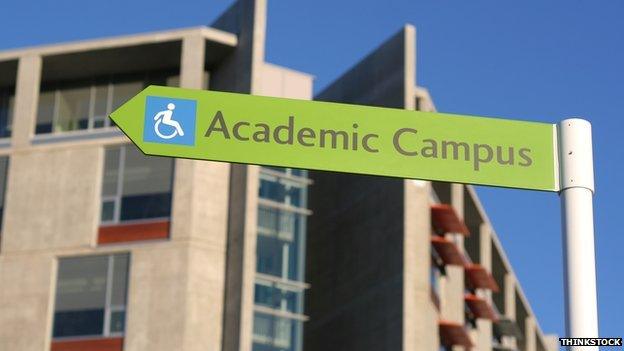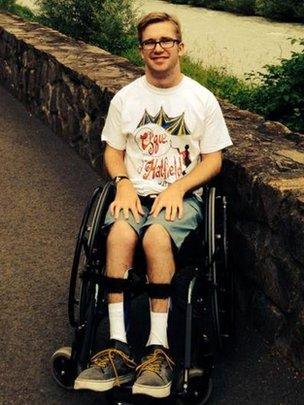Disabled students: 'I wish I'd known that'
- Published

As part of BBC Ouch's series on disabled students, graduates give their tips to those just starting out.
Going to university is an upheaval for everyone, but being disabled can mean there is even more to consider. Here, experienced disabled students pass on their wisdoms and tips, from employing personal assistants to getting funding to make their studies more accessible.
Choose your assistant wisely
"The biggest thing for me was finding a personal assistant (PA) who not only met my needs, but matched my personality," says Michaela Hollywood, a postgraduate student in Northern Ireland who has muscular atrophy and uses a wheelchair.
The 24-year-old employs a PA for university but has care from her parents when she's at home. She hires her PAs via an agency who advertise online. Michaela used to post the agency adverts where graduates of occupational therapy and physiotherapy could see them, feeling that "they wouldn't be afraid to do personal care". Her PAs help her with daily tasks such as sitting straight in her chair and assisting with going to the toilet.
She had difficulties with the first PA she hired. "She wouldn't speak unless spoken to, which put me under a lot of pressure," she says. "My grades were much lower in that semester than any other."
Her latest assistant is a politics graduate with no care experience, but Michaela says the partnership is going well and has unforeseen benefits: "She can attend my lectures when I am too sick to go."
Different people want different things from their PA and a common debate is about whether he or she should melt into the background allowing the disabled person to shine, or join in with conversations and activities. Hollywood says her PA is involved in many areas of university life and helps immensely by pushing her forward, making her feel more included.
But for Jamie Green, external, a languages student with cerebral palsy at Durham University, this involvement would make him feel "very awkward".
Know your DSA
For disabled students attending university in England there is a grant available to meet the costs of extra equipment and support - the Disabled Students' Allowance (DSA). Wales, Scotland and Northern Ireland have similar schemes.
Ticking 'disabled' on a UCAS form or the relevant box on a student loan form should start a multi-step application process. Most students we spoke to got their DSA on time and without any fuss.
But visually impaired student Lucy Hayward didn't know to apply for DSA until late September and so received no support until the following March.
.jpg)
Michaela says it's important to find a suitable PA
As part of an application for DSA, every person must have an assessment to determine what equipment they require. "Other students told me of a place I could go to test out assistive technology and other equipment," Lucy says. As a result she knew what she wanted, asked for it, and got most of it. If she hadn't known about this she would have only received the basic equipment every disabled student automatically gets, she says.
Oxford graduate Martha Buckley says it is important to note that disabled students at university may need different help to what they received at school. "I resisted having library assistance for ages because I'd never had a support worker before, and was too proud to admit I might need more help," she says. "But actually having someone to do runs with piles of books made studying so much easier."
Manage your expectations
Martha says there is a general feeling that university is "where you have to make lasting friendships, have nights of awesome parties and find the person you want to spend the rest of your life with."
She meets lots of disabled students in her work running the Oxford Access Guide, external and says it's important to remember that university doesn't have to be the best years of your life.
"Just enjoy it for what it is, and remember that if it's not totally epic, you haven't failed as a person," she says.

Jamie Green says it can be harder for disabled people to make friends at university
Jamie Green agrees. He says that it can be harder for disabled people to get to know others quickly, as is often expected of students in fresher's week. He says he made most of his best friends in the second term and even second year, by getting involved in as many things as possible. "I was surprised and pleased at how open minded people were about my disability," he says.
Do your research
The consensus is that disabled students should go and see as many of the universities they apply for as possible, particularly if physical access is a consideration.
"Have a look at what's accessible, what's not, what might be tricky and what's possible," advises Jamie. He says there is enough to contend with with making friends and starting a new course without needing the added pressure of a new environment to navigate.
He says the most important consideration should be the course, and practicalities should come second.
Don't let anyone tell you what course you should do
Michaela Hollywood says she felt as if she was being pushed towards computing or law as areas of study, and maintains she was discouraged from doing a journalism course. "They didn't want me in front of a TV camera or a radio microphone," she says. She did take journalism, and later achieved student of the year.
When she wanted to pursue a course in genetics she was told that the laboratories and practical sessions weren't accessible. She was confident that it would work but her health deteriorated at that time and she opted to study public relations instead. She is now taking a postgraduate in lobbying government and urges any disabled student to study what makes them happy.
Are you a current or former disabled student? We'd like to hear about your experiences of life at university. Email us at Ouch@bbc.co.uk, tweet @BBCOuch, external using the hashtag #disabledstudents, or get in touch via Facebook, external
Follow @BBCOuch, external on Twitter and on Facebook, external, and listen to our monthly talk show